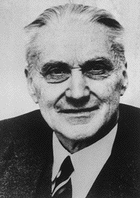|
|
||
| The Norwegian economist Ragnar Anton Kittil Frisch was
the lord of economic nomenclature. He coined many of the words and
phrases we are now familiar with in economics, such as "macroeconomics",
"econometrics" and "flow-input, point-output",
"impulse and propagation", etc. Some of his novel words
did not really catch on (e.g. "passus coefficient", "polypoly",
the "pari-passu law", etc.), but that hardly deterred
him. At any rate, Frisch was in an excellent position
to be master wordsmith: he also helped create the very fields he
littered with his nomenclature.
Born 1895 in Oslo, the only son of a silversmith, Frisch was expected
to follow his father's trade and took positive steps in that direction,
e.g. an apprenticeship, a journeyman year. He studied economics at
the University of Oslo (graduating in 1919), but he remained involved in
his father's silversmithy. After a couple of years studying in
Paris and England, Frisch returned to lecture at Oslo in 1924, becoming
assistant professor in 1925.
Frisch research on economic theory and statistics yielded his famous
1926 paper on consumer theory (followed up by his 1932 book) which set
in motion the axiomatization of consumer demand and set forth the
possibility of empirically measuring marginal utility. It was here,
incidentally, where the term "econometric" was first used. Another of Frisch's idiosyncratic claims to fame was his meticulousness and great reluctance to publish; despite the great popularity and dissemination of his working papers and monographs. In the 1920s, he began lecturing on production theory, constructing in the process much of the formal Neoclassical theory of production. His classnotes of the 1920s were eventually published in a 1965 book -- long after his contributions had made their way into the theoretical canon. His dissertation (1927) on time series and statistics were also distributed widely in monograph form. Work done during the war on the computation of elasticities was only published in 1959. Finally, there is the famous "macrodynamic/time series" research program that he worked on -- and famously announced in his famous 1933 Cassel festschrift -- which was never quite finished and so never published. In 1927, he left for a Rockefeller Foundation trip to the United States, meeting the leading mathematical economists of the day. He made a particularly strong impression of Irving Fisher and, together with Charles Roos, they began planning the formation of the Econometric Society. Soon after Frisch returned in 1928, his father died, leaving the family business in his hands. He made the conscious decision to press ahead with his economics work, delegating much of the management of the silversmithy to others. In 1930, on Fisher's invitation, Frisch left for the United States to spend a couple of years at Yale and Minnesota. It was a quite fruitful sojourn: Frisch not only produced several excellent papers and monographs, he also set the Econometric Society in motion. Frisch returned to Oslo in 1931. In 1932, he founded the Rockefeller-funded Institute of Economics at the University of Oslo. It was this time he put the finishing touches on his American work and, with his student, Trygve Haavelmo, went off in search of the macrodynamic grail. He also began his job as a highly influential Editor-in-Chief of Econometrica, a position he would hold from 1933 until 1955. He was imprisoned for a year by the Nazis during the war. He stayed remained at Oslo for much of the rest of his life. Frisch's impact on economics has been substantial. His 1926 paper helped set the axiomatic-deductive Neo-Walrasian research programme in motion. His formalization of production theory (1965) has already been mentioned. Frisch's work on econometrics - particularly on time series (1927) and linear regression analysis (e.g. 1934) - was to be a fundamental contribution to the later Cowles approach to econometrics. His 1933 work on impulse-propagation business cycles, (together with that of Slutsky) was to prove the organizing principle behind much of modern New Classical real business cycle theory. He also contributed much to large decision models for government planning. Justifiably, Ragnar Frisch shared the first Nobel Memorial Prize in 1969 with Jan Tinbergen. Major works of Ragnar A. Frisch
"Sur un problème d'économie pure", 1926, Norsk
Matematisk Forenings Skrifter (reprinted in Metroeconomica,
1957.)
Analysis of Statistical Time Series, 1927 - unpublished
|
